Shannon Wotherspoon
Cross-Lingual Conversational Speech Summarization with Large Language Models
Aug 12, 2024Abstract:Cross-lingual conversational speech summarization is an important problem, but suffers from a dearth of resources. While transcriptions exist for a number of languages, translated conversational speech is rare and datasets containing summaries are non-existent. We build upon the existing Fisher and Callhome Spanish-English Speech Translation corpus by supplementing the translations with summaries. The summaries are generated using GPT-4 from the reference translations and are treated as ground truth. The task is to generate similar summaries in the presence of transcription and translation errors. We build a baseline cascade-based system using open-source speech recognition and machine translation models. We test a range of LLMs for summarization and analyze the impact of transcription and translation errors. Adapting the Mistral-7B model for this task performs significantly better than off-the-shelf models and matches the performance of GPT-4.
Using heterogeneity in semi-supervised transcription hypotheses to improve code-switched speech recognition
Jun 14, 2021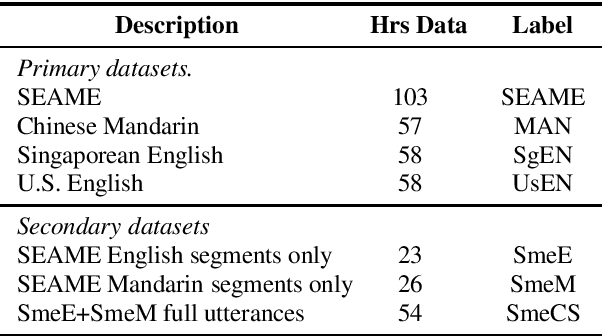

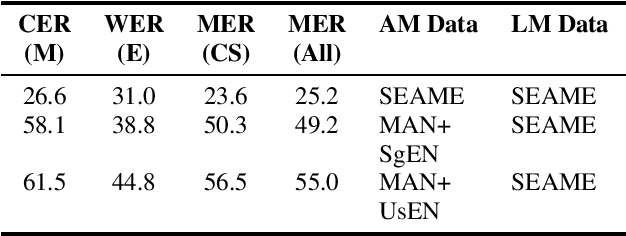
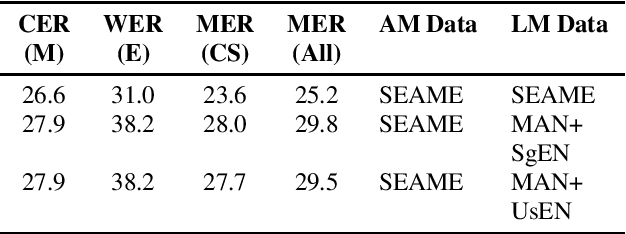
Abstract:Modeling code-switched speech is an important problem in automatic speech recognition (ASR). Labeled code-switched data are rare, so monolingual data are often used to model code-switched speech. These monolingual data may be more closely matched to one of the languages in the code-switch pair. We show that such asymmetry can bias prediction toward the better-matched language and degrade overall model performance. To address this issue, we propose a semi-supervised approach for code-switched ASR. We consider the case of English-Mandarin code-switching, and the problem of using monolingual data to build bilingual "transcription models'' for annotation of unlabeled code-switched data. We first build multiple transcription models so that their individual predictions are variously biased toward either English or Mandarin. We then combine these biased transcriptions using confidence-based selection. This strategy generates a superior transcript for semi-supervised training, and obtains a 19% relative improvement compared to a semi-supervised system that relies on a transcription model built with only the best-matched monolingual data.
Speech Synthesis as Augmentation for Low-Resource ASR
Dec 23, 2020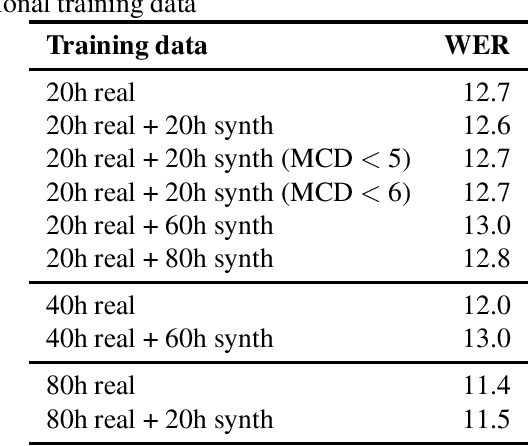
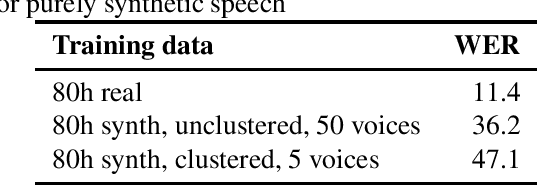
Abstract:Speech synthesis might hold the key to low-resource speech recognition. Data augmentation techniques have become an essential part of modern speech recognition training. Yet, they are simple, naive, and rarely reflect real-world conditions. Meanwhile, speech synthesis techniques have been rapidly getting closer to the goal of achieving human-like speech. In this paper, we investigate the possibility of using synthesized speech as a form of data augmentation to lower the resources necessary to build a speech recognizer. We experiment with three different kinds of synthesizers: statistical parametric, neural, and adversarial. Our findings are interesting and point to new research directions for the future.
 Add to Chrome
Add to Chrome Add to Firefox
Add to Firefox Add to Edge
Add to Edge